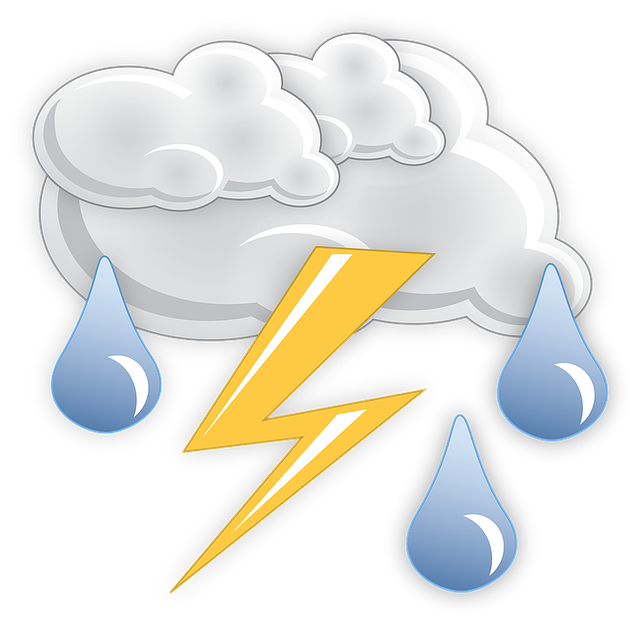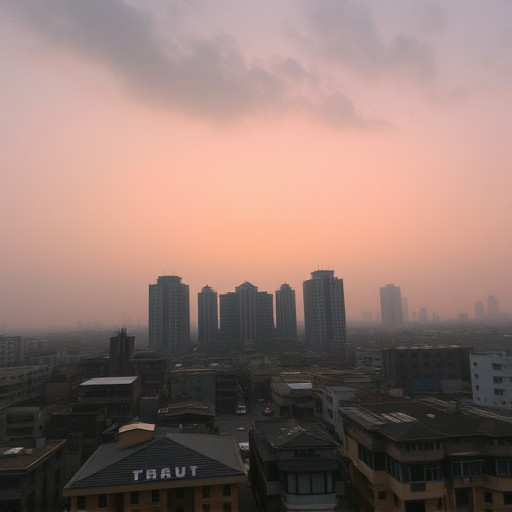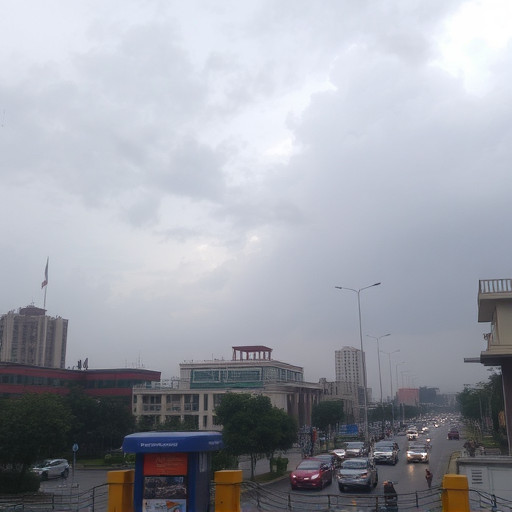
This week, Karachi is bracing for moderate to heavy rainfall with up to 50 mm of precipitation expected by mid-week due to an active monsoon system. Authorities have issued flood advisories, warning of potential flash and urban flooding, particularly in low-lying areas. The weather dynamics are influenced by moisture from the Arabian Sea and prevailing winds. Residents are advised to follow safety guidelines, including staying updated on weather conditions, securing essential items, clearing drains if safe, and assembling emergency supplies. Civil defense agencies have mobilized additional resources for flood defenses to protect lives and property. Traffic safety measures are in place with recommendations for motorists to drive cautiously and public transit services to adjust their schedules to avoid disruptions from the heavy rains. Power outages are a risk due to the fragility of Karachi's electrical infrastructure during monsoon season, so residents should prepare for potential power interruptions by stocking up on alternative lighting sources and securing electronics. Health and safety are also highlighted, with concerns about respiratory infections, waterborne diseases, and mosquito-borne illnesses, emphasizing the importance of avoiding standing water, maintaining hygiene, monitoring air quality, and staying indoors if you have chronic health conditions. Maintaining a dry environment and access to clean drinking water are also advised as precautions for the rainy season in Karachi.
7 Key Updates on Karachi’s Rainy Weather This Week: As Karachi braces for a week of intermittent showers, staying informed is crucial. This article provides a comprehensive overview of precipitation patterns, detailing daily rainfall projections to help residents plan accordingly. With the risk of flooding, timely alerts will outline potential overflow zones and safety measures to ensure public safety. Traffic advisories will guide motorists and commuters through wet roadways and keep them updated on public transit adjustments. Power outages are a common concern during heavy rains; this article offers practical tips for preparing your home to minimize disruptions. Health precautions are also imperative, as we navigate the potential health risks associated with the rainy season. Furthermore, the economic impact of such weather is significant, and this piece will explore business continuity plans that can be implemented during inclement weather. Lastly, environmental observations aim to shed light on long-term weather trends in Karachi, providing valuable insights into how we can adapt to these changes and mitigate future challenges. Stay dry, stay informed, and stay safe.
- Precipitation Patterns: Daily Rainfall Projections for Karachi
- Flood Alert: Potential Overflow Zones and Safety Measures
- Traffic Advisories: Navigating Wet Roadways and Public Transit Updates
- Power Outage Preparations: Electrical System Vulnerabilities and Tips
- Health Precautions: Staying Safe and Healthy Amidst the Rain
Precipitation Patterns: Daily Rainfall Projections for Karachi

This week, Karachi’s precipitation patterns have been closely monitored to predict daily rainfall projections. The Meteorological Department has indicated a likelihood of moderate to heavy showers over the next few days, with the highest chances of rain occurring in the evenings and early mornings. These forecasts suggest that Karachi may receive a total accumulation of 25-50 mm of rainfall by mid-week, which is significantly higher than the average precipitation for this time of year. The onset of these rains is attributed to an active monsoon system that has been influencing the region’s weather. Residents are advised to stay updated with local weather advisories as sudden changes in weather can lead to flash flooding in low-lying areas, particularly in the city’s peripheries. Additionally, the potential for urban flooding remains a concern due to Karachi’s drainage infrastructure challenges. The projections indicate that the rainfall intensity and duration will be key factors in determining the impact on the city’s daily activities, including transportation and commerce. It is also worth noting that the influx of moisture from the Arabian Sea, coupled with the prevailing winds, will continue to shape Karachi’s weather dynamics throughout the week.
Flood Alert: Potential Overflow Zones and Safety Measures

This week, Karachi’s rainy weather has prompted meteorological authorities to issue a flood alert as the city braces for potential heavy downpours. The areas most at risk of overflow include low-lying neighborhoods and those with clogged drainage systems. Local civil defense agencies have put forth safety measures to mitigate risks, emphasizing the importance of public vigilance and preparedness. Residents are advised to stay informed through official channels and to take necessary precautions such as moving valuable belongings to higher ground, clearing drainage paths if safe to do so, and preparing emergency kits. The authorities have also deployed additional resources to reinforce flood defenses at critical points across the city. These measures aim to ensure a swift response in case of an emergency, thereby safeguarding life and property amidst the forecasted rainy conditions.
Traffic Advisories: Navigating Wet Roadways and Public Transit Updates

As Karachi’s rainy weather patterns persist, the city’s traffic advisories have become increasingly crucial for residents and commuters alike. The Metropolitan Corporation of Karachi has implemented a series of measures to ensure safety on wet roadways. Motorists are advised to adjust their driving habits, reducing speeds to account for reduced friction and increased stopping distances on slick surfaces. Additionally, the use of headlights is recommended to enhance visibility in poor weather conditions. Public transit authorities have also adapted to the inclement weather, with scheduled adjustments to routes that may be affected by waterlogging or flooding. Commuters are encouraged to check for updates from the Sindh Transport Department and local bus operators for real-time changes to bus routes and schedules. The Karachi Circular Railway (KCR) has also modified its operations to accommodate the weather, with announcements regarding any cancellations or delays due to heavy rains. These adjustments are designed to keep the city moving safely during Karachi’s rainy season.
Power Outage Preparations: Electrical System Vulnerabilities and Tips

As Karachi braces itself for its rainy weather this week, power outages have become a significant concern, particularly due to the vulnerabilities within the city’s electrical system. The heavy rains often lead to flooding, which can cause short circuits and water damage to critical components of the power infrastructure. To mitigate these issues, the local utility companies have been proactive in conducting regular inspections and maintenance checks on their equipment, ensuring that the electrical grid can withstand the harsh conditions brought by the wet season. Residents are advised to prepare for potential power disruptions by having backup lighting solutions such as battery-operated lanterns or flashlights readily available. It’s also recommended to secure loose electrical cords and ensure that electronic devices, particularly those sensitive to moisture, are kept away from areas prone to flooding. Additionally, having an emergency kit with essential items like batteries, a first aid kit, and some non-perishable food can be incredibly helpful during prolonged outages. By taking these precautions, Karachi’s residents can minimize the inconvenience caused by power outages and maintain safety and comfort amidst the rainy weather updates this week.
Health Precautions: Staying Safe and Healthy Amidst the Rain

With the onset of Karachi’s rainy season, it is imperative to take proactive health precautions to maintain safety and well-being amidst the wet weather. The increased humidity and potential flooding can lead to a spike in respiratory infections, waterborne diseases, and skin infections. Individuals are advised to avoid standing water to prevent mosquito bites, which are crucial steps in curbing the spread of diseases like dengue and malaria. Additionally, hygiene practices such as regular handwashing with soap and clean water become even more critical to prevent illness.
Moreover, the rain can exacerbate existing health conditions, particularly for those with chronic ailments like asthma or heart disease. It is recommended to monitor air quality indices and to stay indoors during heavy downpours when pollution levels are at their peak. Proper ventilation in homes and workplaces, along with maintaining a dry environment to prevent mold growth, will help mitigate respiratory issues. Furthermore, individuals should ensure they have access to clean drinking water and maintain warm clothing as the rainy weather can be quite chilly. Adhering to these health precautions will not only protect oneself but also contribute to the community’s overall health amidst Karachi’s rainy conditions this week.
As this week’s rainy weather pattern in Karachi winds down, residents have been provided with crucial updates across seven key areas to ensure preparedness and safety. From daily rainfall projections to flood alert zones, the city’s response to these wet conditions has been comprehensive, including traffic advisories, power outage preparations, and health precautions. The collective effort of local authorities and citizens has highlighted the importance of staying informed and vigilant during such weather events. With these updates in hand, Karachi continues to adapt and thrive amidst the rain, reinforcing its resilience against nature’s challenges.


